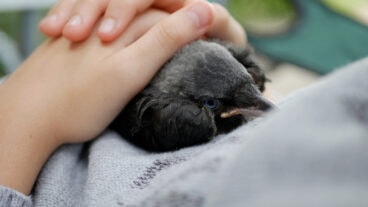Changing the economics and health of African villages: Sivan Achor-Borowich, the Israeli founder of Jewish Heart for Africa.
As Westerners, there are some things we really can’t understand about Africa unless we’ve been there. That’s what Sivan Achor-Borowich discovered over the last decade. While working for a clothing manufacturer and then the United Nations, the Israeli woman fell in love with Africa. She understood how very small things — like a single light bulb shining at night — could drastically improve peoples’ lives.
With this in mind, 30-year-old Achor-Borowich founded the NGO, A Jewish Heart for Africa, in New York, raising money in America but using technology developed in Israel. In the year since it began work, she estimates that the NGO has changed the lives of more than 30,000 Africans in Ethiopia, Tanzania and Uganda.
Connecting America to Israel was logical for Achor-Borowich. Noticing that Africans lack basic needs like fresh water, or a refrigerator to store medicines in their clinics, Achor-Borowich got an idea.
“We started with solar power because without energy you cannot do much,” she says. And as an Israeli, she turned to the obvious: Israeli solar technologies are well known around the world.
Helping Africans catch the sun
The NGO’s first project, Project Sol, is designed to bring solar power to African clinics and schools. Solar power is an obvious choice in Africa where the sun shines about 12 hours a day.
“At night if a doctor has to treat patients, he has to do it with candles. With $4,000 we are installing solar panels and eight to 10 lights in a clinic. We put the lights both inside and outside so people can actually find the clinic at night,” she tells ISRAEL21c.
The solar panels, bought at cost price from Israeli company Interdan, are also used to power refrigerators used to store and preserve medicines. “It gets so hot there that even when the clinics get vaccines they don?t keep for very long [without a fridge],” explains Achor-Borowich.
Basic lighting is a first step, but another pressing concern, says Achor-Borowich, is being able to pump water so that women and children don’t have to walk miles to collect it. With rapid deforestation in Africa, and the effects of global warming already felt, finding clean drinking water is becoming more of a problem every day.
Expanding food production with drip irrigation
Project Sol’s solar energy panels are also being put to use to power water pumps, now able to pull water from 200 meters below the ground. This is part of the NGO’s new venture in Africa, Project Agro. Achor-Borowich and her team of 24 volunteers will install Israeli drip irrigation technology from the company Netafim in Tanzania and Uganda, where the company already has distributors in place.
Water pumped from beneath the ground will be fed into Netafim’s water saving drip irrigation pipes to help African villagers expand agricultural production in locations where food is scarce.
“We are pumping 20,000 liters of water per day — it’s changed the entire economics of the village and the peoples? health. They can grow food,” says Achor-Borowich, who came up with the idea for the NGO while studying at Columbia University in New York, where she received an MA in International Energy Management and Policy, and later at her job with the United Nations Development Program.
A Jewish Heart for Africa is also powering a synagogue in Uganda, for the Ugandan Jews who converted to Judaism 100 years ago. “We’ve powered their chicken farm and a community center; a library, synagogue and we’re powering their homes,” she says.
In about two years, A Jewish Heart for Africa plans to send volunteers to the field in Africa. In the meantime, says Achor-Borowich, cash donations are most welcome to continue buying the much-needed infrastructure.











